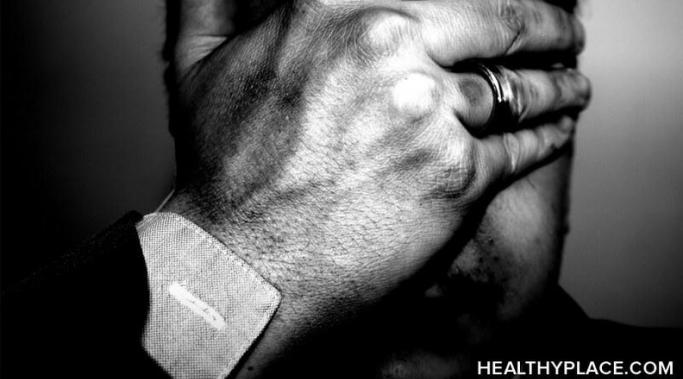Once victims realize they're being abused, many of us immediately think, "I've gotta get out of here!" And the pressure's on the victim to DO something about the situation. Right now.
We know abuse victims often return to their abuser many times before leaving (if they do leave). We know our family, friends, and society tells us to "Get Out Now!" We know we want to leave. We know we fear the abuser on many levels as much as we fear being without them. We know that leaving is an option . . . but at what cost?
Leaving an abuser is not always an immediately viable option, but everyone outside of ourselves (and our abuser) seems to think you must leave NOW. When you realize your partner abuses you, the only answer supported by others is you packing your bags and walking away into the "good for me" sunrise. And we victims buy into that idea, and that's when a new kind of self-punishment begins.
Stop Abuse
What is the process by which someone becomes an abuse victim? What part do abuse victims play in the abusive cycle?
Those questions leave me wanting an easy answer so I can wrap up my abusive experience in a neat little package and set it away in an attic where it would slowly disintegrate in the musty air. Unfortunately, the easy answers elude me. Easy or not, here is a part of my theory about how people become abuse victims in the first place:
When I heard my ex-husband tell me what I was thinking, doing or feeling, he was usually wrong. He painted a picture of me that was so far from my reality that I felt it was imperative to correct him; I was not the person he described. The argument that followed invariably left me in tears, hurt and feeling unheard, misunderstood, and hopeless of finding intimacy with the man I loved.
I wondered why he married me when he thought I was such a selfish, conniving, miserable woman. I was the same woman at 35 as I had been at 20. His constant nit-picking at my faults (and my willingness to examine myself to see if he was right) practically halted my personal development. I spent so much time double-checking who I was that I didn't have time to consider who I would like to be.
The law doesn't help abuse sufferers much unless
you have photos of bruises or other injuries and
were brave enough to go to the hospital to have them treated and
filed a police report and
immediately left your abuser - the first time.
That may be simplistic, but it appears to be true in the news stories. So, because most abuses occur before anyone gets hit, sufferers of abuse and relationship-related trauma must learn to find justice for their battered psyche on their own.
The Bill of Rights was added to the United States Constitution to ensure the federal government did not trample the rights of the people. At the time, many contested the Bill of Rights saying that the federal government had no power that was not explicitly enumerated in the Constitution, so there was no need to spell out the Peoples' rights.
Well, it's a good thing we do have the Bill of Rights because today it serves to remind the government to stay in its' own lane.
Like our country's Bill of Rights, there should be no need for a Partner's Bill of Rights within a relationship. However, when you love someone, it is easy to blur the boundary lines between "me" and "you" as two merge into "one relationship." When you consider that in an abusive relationship there is one partner fighting to completely engulf the other partner into him or herself, then the boundary lines easily become non-existent.
No matter what the Constitution of your relationship, it is a good idea to keep in mind the following inalienable rights.
Abusers who have not yet turned to physical violence could be "time bombs" with fuses of unknown length. If your abuser feels that his "normal" verbally abusive techniques are not working, he will probably move into physical abuse to maintain his control.
Abuse escalates over time. Time spent in abusive situations and relationships cause you to feel beaten down and devastated - but it is never too late to get help.
In 2008, I began counseling again. The doctor wrote the referral for depression. But when I got to my therapist's office, I told her I was there because I was emotionally and verbally abused with an occasional go-round with physical violence. I told her I was depressed for sure, but what I needed to know was how to deal with the abuse.
She asked me if I'd considered leaving my marriage; I didn't want to do that.
The life you want will become reality if you leave your abusive relationship with an educated, clear mind. If you leave the relationship as a victim, you will find yourself victimized in your "new" life, too. You must find your strength before you walk out the door because friend, you will need every bit of your power (and some borrowed from those who love you) if you want to create a life of joy and happiness.
If you are a verbal abuse sufferer, your abuser tells you how selfish you are on a regular basis. You listen to your abuser's opinion on this matter with bated breath, waiting to hear how you are acting selfishly so you can stop doing it...right now! The backwards thing about it is that you martyred yourself for the relationship by sacrificing so many of your own "selfish" desires that you are now creating a confined, tiny life full of limitless impossibilities.
During my abusive marriage, I learned a disordered and negative coping mechanism. The coping mechanism made me behave manipulatively. It sometimes made me wonder if I was the abuser. This coping mechanism kept me blind to the real danger I lived in but very aware of how much I blamed only myself for causing so much pain. Some call this particular disordered coping mechanism codependency.









